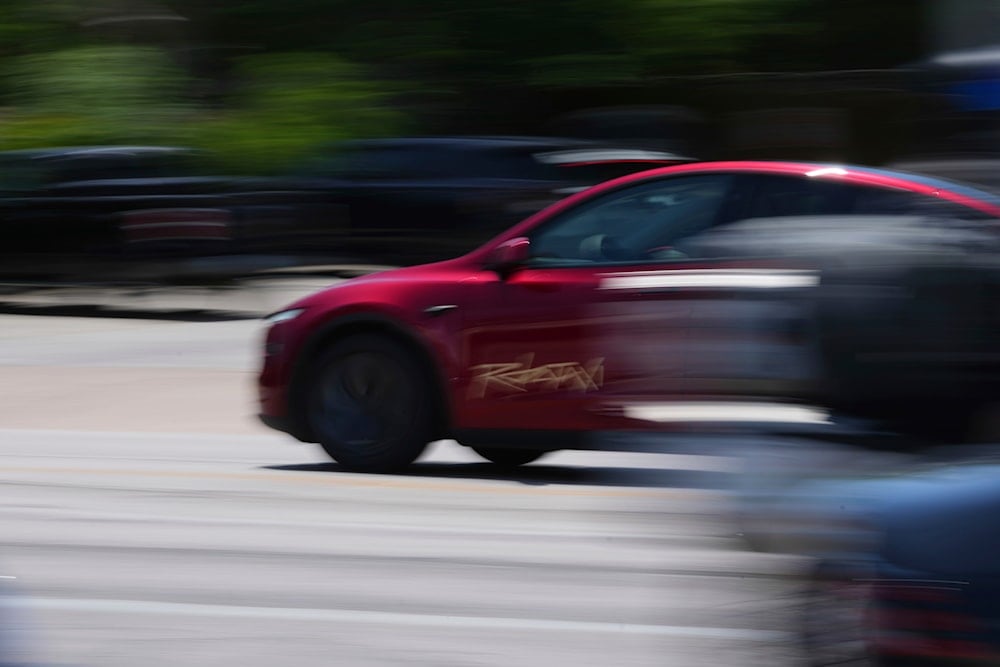Tesla ordered to pay $243 million in Florida autopilot crash verdict
A Florida jury finds Tesla partly liable for a fatal 2019 Autopilot crash, awarding $243 million in damages, a landmark case that could trigger more lawsuits.
-

A driverless Tesla robotaxi, a ride-booking service, moves through traffic on June 22, 2025, in Austin, Texas. (AP Photo/Eric Gay)
A federal jury in Miami on Friday ordered Tesla to pay $243 million in damages over a fatal 2019 crash involving its Autopilot system, a significant legal setback that could open the door for further lawsuits against the electric vehicle maker.
The case involved the death of Naibel Benavides Leon and severe injuries sustained by her former boyfriend, Dillon Angulo. The jury awarded $129 million in compensatory damages and $200 million in punitive damages. Tesla was found 33% liable, equating to $42.6 million of the compensatory sum.
The remaining liability, 67%, was assigned to the driver, George McGee, who was not a defendant and therefore not required to pay.
The crash occurred on April 25, 2019, when McGee was driving a Tesla Model S at roughly 62 mph (100 kph). He allegedly ran both a stop sign and a red light before crashing into a parked Chevrolet Tahoe on the side of the road, where Leon and Angulo were standing.
Leon was thrown more than 75 feet (23 meters) and died at the scene, while Angulo suffered serious injuries. McGee reportedly reached down to retrieve a dropped phone moments before the impact and claimed he received no alerts from the vehicle’s Autopilot system.
Tesla to appeal the decision
Tesla said it would appeal the verdict, arguing the driver was solely responsible. "Today's verdict is wrong and only works to set back automotive safety and jeopardize Tesla’s and the entire industry’s efforts to develop and implement life-saving technology," the company said.
Tesla further claimed, "To be clear, no car in 2019, and none today, would have prevented this crash. This was never about Autopilot; it was a fiction concocted by plaintiffs' lawyers blaming the car when the driver, from day one, admitted and accepted responsibility."
Legal experts say the decision is likely to have broad ramifications for Tesla and the autonomous vehicle industry. The case marked the first time Tesla was found liable in a wrongful death case involving its driver assistance system.
"This is the first time that Tesla has been hit with a judgment in one of the many, many fatalities that have happened as a result of its Autopilot technology," said Alex Lemann, law professor at Marquette University.
Philip Koopman, an autonomous technology expert at Carnegie Mellon University, noted, “The only way the jury could have possibly ruled against Tesla was by finding a defect with the Autopilot software. That’s a big deal.”
Following the verdict, Tesla shares dipped 1.8% and are down 25% year-to-date. The outcome could complicate CEO Elon Musk’s push to position Tesla as a leader in autonomous vehicles and robotaxis, which the company plans to begin producing next year.
As Tesla faces slowing EV sales, much of its nearly $1 trillion market valuation hinges on its pivot toward robotics and artificial intelligence.
Tesla faces lawsuit over defects in autopilot system
A similar incident occurred in 2023 when Tesla was sued for misconduct and intentional negligence concerning technical defects in their Autopilot option for Model 3 cars, and the judge found reasonable proof to hold Tesla liable.
In 2019, Stephen Banner was involved in a car accident after his autopilot vehicle crashed into an 18-wheeler in Miami, causing his death. His wife took the case to court and accused the company of intentional negligence.
Judge Reid Scott reported that evidence has been found to prove that Tesla intentionally engaged in misleading marketing strategies that deluded consumers into believing their product was autonomous. He also found that "Tesla’s warnings in its manuals and “clickwrap” were inadequate". He brought up a precedent involving another fatal car crash, during which Tesla's self-driving system failed to work.
Additionally, Tesla was sued in 2022 over the same claims of defective autopilot systems and false advertising. The California Department of Motor Vehicles charged Tesla in July for misrepresenting the features of its Autopilot and FSD systems. The lawsuit claimed that Musk and Tesla continued to misrepresent Tesla's autonomous capabilities even after they were proved to be wrong, time and time again.

 4 Min Read
4 Min Read









